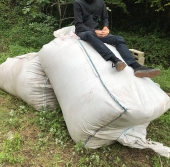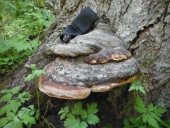Trace Oswald wrote:I'm always confused by using mushrooms to remove contaminants from soil, or in this case, bales. If you use mushrooms to remove toxins, common consensus seems to be that the mushrooms should not be eaten. To me, that means they are bringing the toxins into themselves. ..... Or maybe I just don't understand how it works and the mushrooms actually transform the toxins into something else.
Tonya Hunte wrote: I believe because mushrooms are composters that they can really break down the chemical structure of things.
Fungi have the ability to cleave chemical compounds into either lesser innocuous compounds and/or individual atomic elements. It is also best to err on the side of caution and not eat fruiting mushroom bodies that are being used to remediate, though my suspicion is this may vary depending on the kind of remediation being done. For example, if there are heavy metals, those most of us know are already elements and cannot be broken down further and it may be possible for heavy metals to end up in mushroom fruiting bodies, but I'm not 100% sure, I'm not a mycologist. If the remediation is being done on these straw bales for example, where the culprit is likely some sort of herbicide or pesticide as examples, then I personally would just compost the mushrooms, and if for some reason there are traces of a toxic compound, the fungal and bacterial activity in a healthy, active compost pile will take care of that.
Here are a few posts written by permies resident soil biologist Bryant Redhawk discussing this subject:
I am working, with another fellow, on a remediation study which uses fungi to break down herbicides in soil and wood, at this point in the study we have eliminated some species and found other species that work quickly to start breaking the compounds into harmless components.
Oyster is one of the best species for this and should be included in any remediation of herbicide treatment.
from: Raised garden hugelkulture -
https://permies.com/t/85398/Raised-garden-Hugelkulter#704498
.... so we get a nice, hot compost heap.
When that heat is through working its magic on the heap you are ready to use it in your gardens. The nasty chemicals will be broken down and harmless to your plants.
The compost will also be chock full of good microorganisms and fungi hyphae, a huge win for your garden soil.
from: Composting food or plants with pesticides -
https://permies.com/t/89293/Composting-food-plants-pesticides#742048
..... fear not, there is hope and you can remediate those chemicals so your foods are not contaminated.
You can purchase fungi either in spore or spawn forms these days and that is what will break down those nasty chemicals as well as getting your soil food web kick started for recovery.
You can also go wild foraging for mushrooms and use a blender and water to create mushroom slurries which you pour into the soil to do the same thing.
from Plant vegetables in Herbicided lawn -
https://permies.com/t/86624/Plant-vegetables-Herbicided-lawn#712727
Hope this helps!









